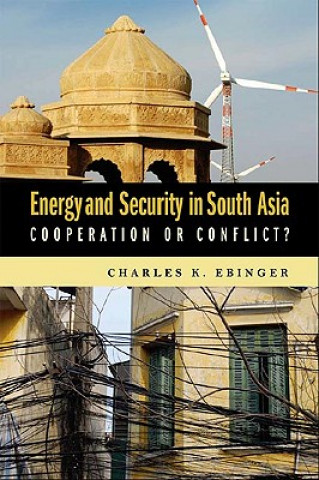
Доставка
Наръчник за пазаруване





Не ви допада? Няма проблеми! При нас имате възможност за връщане в рамките на 30 дни
 Подаръчен ваучер
на всякаква стойност
Подаръчен ваучер
на всякаква стойност
Няма да сбъркате с подаръчен ваучер. Получателят може да избере нещо от нашия асортимент с подаръчен ваучер.
Energy and Security in South Asia
 Английски език
Английски език
 111 b
111 b
30 дни за връщане на стоката
Може би ще Ви заинтересува


Economic growth and burgeoning populations have put South Asia's energy security in a perilous state. Already energy and power shortages are stunting development in some of the region's least developed locations spurring political insurgences and social dislocation. Should this trend continue, Ebinger argues the Subcontinent will face dire economic, social and political crises. In "Energy and Security in South Asia", Brookings ESI director Charles Ebinger, a long-time adviser to South Asian governments, lays out the current regional energy picture arguing that the only way to achieve sustainable energy security is through regional collaboration both within the subcontinent as well as with regional neighbors in the Middle East and Central and Southeast Asia, Dr. Ebinger commences by illustrating the present-day energy environment in each nation as well as the obstacles governments confront in addressing them. Among the issues examined are: the technical strains that near double-digit economic growth are putting on India's dilapidated power infrastructure; the economic costs the country is incurring by increasing reliance on the Middle East for oil and gas resources; the prospects for expanded wind, solar, energy efficiency and nuclear power generation in India to help reduce the nation's growing carbon footprint as it accelerates the use of coal; the implications of Pakistan's expanded use of coal; an analysis of how poor energy pricing systems are bringing about an energy shortage throughout the region; an examination of how strains in Indo/Bengali relations threaten the construction of vital regional energy infrastructure projects; a discussion of how continued political upheaval in Nepal is causing power shortages of up to 20 hours per day; and, an analysis of how hydropower development is fuelling Bhutan's 'Gross National Happiness' campaign. In addition to individual domestic concerns, each nation shares a crisis whereby hundreds of millions on the Subcontinent lack access to electricity and burn inefficient resources such as fuel wood and biomass for lighting, heating, and cooking, thus contributing sizeable carbon emissions. Ebinger then details the need for regional energy cooperation, both within and outside the Subcontinent. Regarding intra-regional collaboration, Nepal, Bhutan, and Bangladesh all have an unrealized opportunity for generating income by exporting their vast hydropower resources to a power-starved India. In addition, Bangladesh and India are yet to come to agreements on gas trade and other vital bilateral energy projects. Outside the subcontinent, a plethora of pipelines have been proposed to ease the Subcontinent's fossil fuel resource thirst. Ebinger examines the Iran-Pakistan-India pipeline, Turkmenistan-Afghanistan-Pakistan-India pipeline, Oman-India subsea pipeline, and the Myanmar-Bangladesh-India pipeline arguing that all these projects offer promises for energy security; however, each has been plagued with political, economic, or security obstacles that have prevented tangible progress. In that light, the third section highlights the geopolitical concerns facing the region's energy security, from the Pakistan-India relationship - and how it relates to energy security, and the developing India-China rivalry for foreign energy resources. China, seen as a competitor to India for Asian economic preeminence, is facing its own energy resource glut. The looming Indian Subcontinent energy crisis will force more than half a billion people - and counting - from emerging from dire poverty, thus potentially sparking domestic and regional instability in an already treacherous area.
Информация за книгата
 Английски език
Английски език


 Контакт
Контакт Как се пазарува?
Как се пазарува?




















